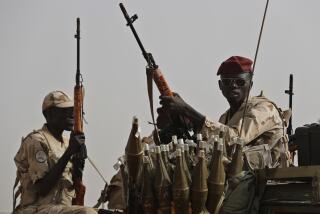Nigeria Moves to Quell Ethnic Violence
- Share via
LAGOS, Nigeria — Nigerian soldiers kicked in doors and interrogated kneeling suspects at gunpoint in a Lagos slum Tuesday to stamp out ethnic clashes that have killed at least 100 people in four days.
The stench of rotting and burned flesh hung in the air, and dozens of charred bodies littered the streets of the Mushin district.
Authorities in Nigeria’s biggest city suggested that the clashes between gangs wielding bows and arrows, guns and machetes might have been engineered to create instability that could lead to an attempt to restore military rule.
Pitted against each other in the violence were Nigeria’s main tribal rivals: Hausas, whose origins lie in the mainly Muslim north; and Yorubas, from the more heavily Christian and animist southwest, around Lagos.
“As of now, you can say 100 have been confirmed dead. About 430 have been wounded,” Nigerian Red Cross President Emmanuel Ijewere said as he helped bring about 3,000 people who had fled Mushin to a temporary camp.
Many homes in the area were torched and looted. “Everything I’ve labored for over 20 years has been destroyed. Now I have only this shirt and these trousers that I’m wearing,” said Segun Ifelade, a Yoruba businessman.
Lagos State Police Commissioner Mike Okiro said 10 people had been detained.
After outbreaks of violence elsewhere in Lagos, troops and police were on alert to stop trouble from spreading. Soldiers were also on standby in northern Nigeria as the riots raised tension across Africa’s most populous nation.
The violence was the latest in a series of deadly clashes since army rule ended in 1999, and it was a stark reminder of Nigeria’s fragility as it gears up for a general election next year.
Nigeria has routinely used the army to put down ethnic disturbances, which have killed thousands since President Olusegun Obasanjo took office in 1999 to end a 15-year spell of corrupt and oppressive military rule.
More to Read
Sign up for Essential California
The most important California stories and recommendations in your inbox every morning.
You may occasionally receive promotional content from the Los Angeles Times.












